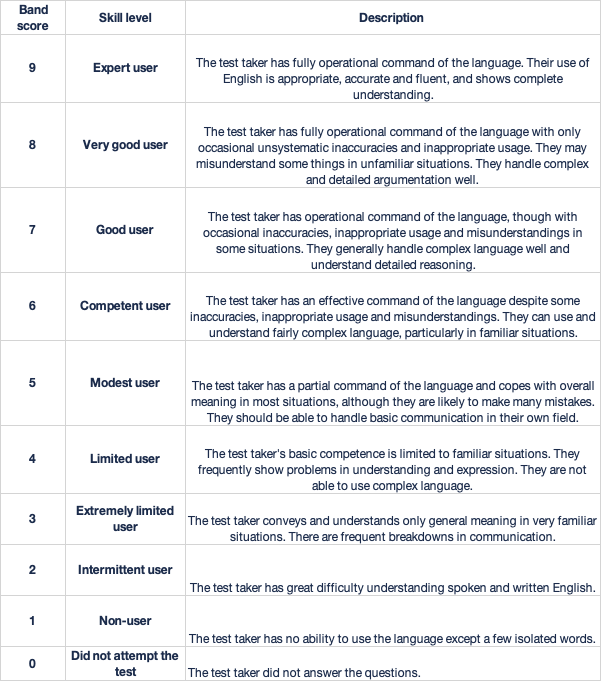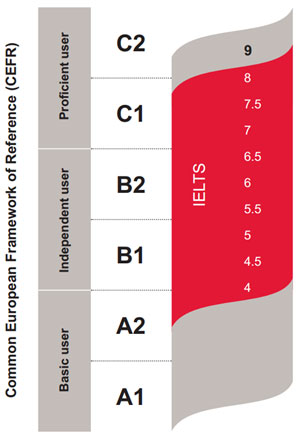IELTS stands for International English Language Testing System. IELTS Test assesses the English proficiency of candidates seeking international education, training, or work in English-speaking countries.
IELTS is a globally accepted test. IELTS is viewed as a compulsory criterion for admission into academic institutions in the United Kingdom, Australia, Canada, South Africa, and New Zealand. Other than academic uses, the IELTS is also required for immigration to some countries for work.
IELTS Test is conducted by the British Council, University of Cambridge ESOL Examinations, and the IDP: ISLETS Australia.
Test Description
The test has two versions:
- Academic Test: IELTS Academic is taken by those who apply for higher education or professional registration abroad.
- General Training Test: IELTS General Test is taken by those who wish to migrate to major English-speaking countries like Canada, Australia, and the UK. This test is also taken by those who want to enroll in training programs or secondary education or want to gain work experience in a country where English is the main language used for communication.
Test Format
IELTS test is divided into four parts:
- Reading (3 sections. Time: 60 minutes)
- Writing (2 tasks. Time: 60 minutes
- Listening (4 recordings. Time: 30 minutes)
- Speaking (2 tasks. Time: 11 — 14 minutes)
The test total time is: 2 hours and 45 minutes
You’ll take the first three parts of the test on the same day, in the following order: Listening, Reading, and Writing (there are no breaks between these tests). Your Speaking test will be held either on the same day or seven days before or after that, depending on local arrangements.
Test Scale
Standard
You will be given a score from 1 to 9 for each part of the test – Listening, Reading, Writing, and Speaking. The average produces your Overall Band Score. You can score whole (e.g., 5.0, 6.0, 7.0) or half (e.g., 5.5., 6.5, 7.5) bands in each part of the test.
Your overall band score is calculated by taking the mean score of the four test components (Listening, Reading, Writing, and Speaking). The score for each component is equally weighted. Your overall band score is rounded to the nearest whole or half band.

4.2 IELTS in CEFR scale

Grading Criteria
IELTS Listening Scores
IELTS Listening contains 40 questions. Each correct item is awarded one mark, so the maximum raw score you can achieve for each component is 40. Band scores ranging from Band 1 to Band 9 are awarded to candidates on the basis of their raw scores (number of correct answers).
Number of marks required for respective Listening Scores*

IELTS Speaking Scores
IELTS Examiners use detailed assessment criteria which describe written performance at each of the 9 IELTS bands.
Examiners award a band score for each of four criterion areas: Fluency and Coherence, Lexical Resource, Grammatical Range and Accuracy, and Pronunciation. The four criteria are equally weighted.
IELTS Reading Scores
IELTS Reading components contain 40 questions. Each correct item is awarded one mark, so the maximum raw score you can achieve for each component is 40. Band scores ranging from Band 1 to Band 9 are awarded to candidates on the basis of their raw scores (number of correct answers).
Number of marks required for respective Reading Scores*

IELTS Writing Scores
IELTS Examiners use detailed assessment criteria which describe written performance at each of the 9 IELTS bands.
Examiners award a band score for each of four criterion areas: Task Achievement (for Task 1), Task Response (for Task 2), Coherence and Cohesion, Lexical Resource, and Grammatical Range and Accuracy. The four criteria are equally weighted.
Official Website
IELTS Home of the IELTS English Language Test
italki brings professional English language teachers directly to you. Practice your English and prepare for the IELTS exam. Click on the link below to find the right teacher for you.







